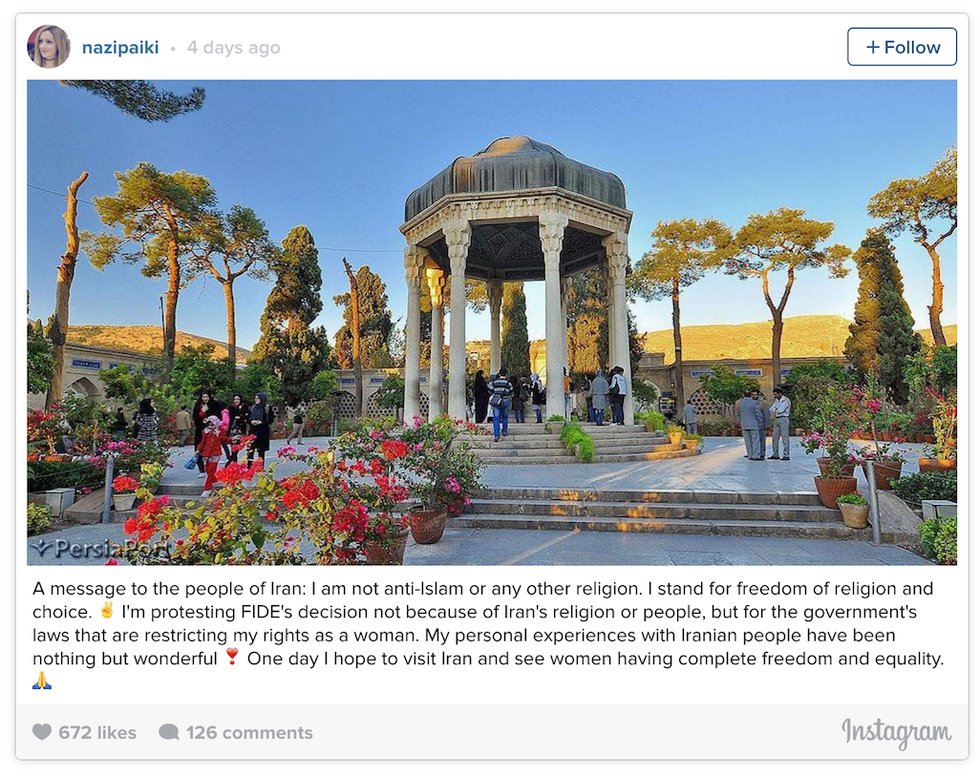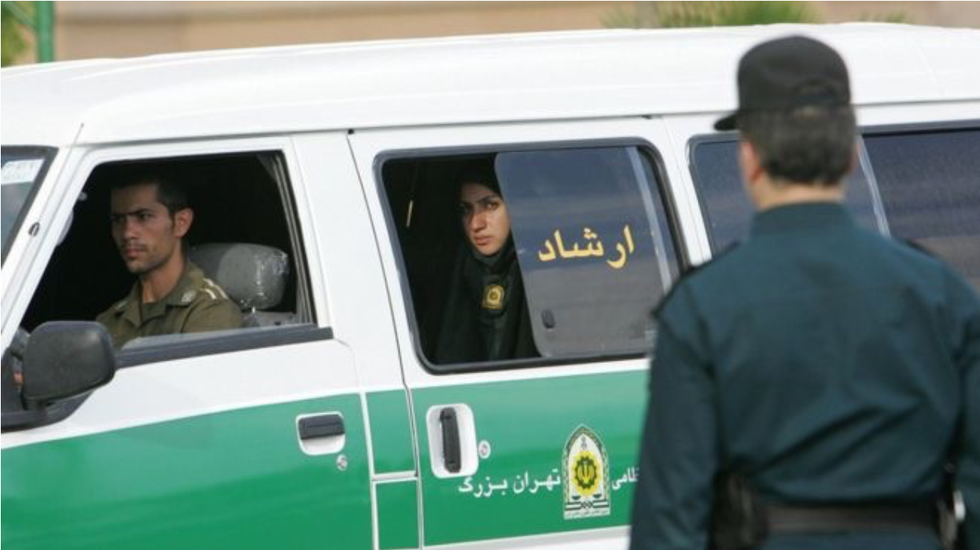The World Chess Federation, or FIDE, has decided that next year's World Chess Championships, which are scheduled to take place next February, will occur in the Islamic Republic of Iran. As expected, several chess Grandmasters have chosen to take a stand against the decision decided upon by the FIDE Congress. Iran, notoriously known as one of the world's worst violators of human and, more specifically, womens' rights, is unapologetic when it comes to their strict adherence to Islamic Law, which includes, but is not limited to, a strict hijab policy for all women - including foreigners.
That hasn't gone over well with everybody.
Immediately following the decision by FIDE to host the event in Iran, which would force women and girls as young as 11 into the unnecessary predicament of choosing between A: circumventing personal decision-making and religious freedom by wearing a hijab, or B: losing out on the opportunity to reach their potential at the highest stage of their craft. As a result, United States chess champion Nazi Paikidze-Barnes quickly condemned the decision, vowing not to participate in the event and instead starting a petition requesting FIDE to reconsider its decision to host the competition “in a place where women do not have basic fundamental rights and are treated as second-class citizens”.
In a later Instagram post explaining her decision, Paikidze, a Russian-born Georgian-American, stated beautifully, “I am not anti-Islam or any other religion. I stand for freedom of religion and choice. I'm protesting FIDE's decision not because of Iran's religion or people, but for the government's laws that are restricting my rights as a woman.”
This strong stance against FIDE, and more specifically Iran’s systematic oppression of women, doesn’t only come from Paikidze, but other top chess masters such as former Pan American champion Carla Heredia, who said, "No institution, no government, nor a Women's World Chess Championship should force women to wear or to take out a hijab.”
They are absolutely right. These competitors are supposed to be coming together to compete and advance themselves in their craft, not be poster-children for some UN-type kum-ba-yah in the name of “religious tolerance."
Instead, Susan Polgar, chair of FIDE’s Commission for Women's Chess, assumed her faux position of moral superiority by proclaiming: "I have travelled to nearly 60 countries. When I visited different places with different cultures, I like to show my respect by dressing up in their traditional style of clothing. No one asked me to do it. I just do it out of respect.” This is, of course, ridiculous, since there is nothing ‘respectful’ about actual punishment for declining Iran and Polgar’s delusional ‘proposal’ of wearing the hijab “out of respect." There’s no need to mention if something is done “out of respect” or not if it is legally required, expected, and harshly punishable if not someone isn't complaint. Polgar could have used a multitude of different phrases, but her desire to drag others into the same corner she’s seemingly chosen to be bullied into caused her to choose “out of respect” over more fitting phrases such as “out of requirement by law” or - most likely, “out of fear of punishment." Considering Islamic Law consequences for non-conformists have resulted in not just arrests, but stoning, lashing, and even acid attacks and/or death, the fear of deviating from the norm is a valid one.
Seemingly unbeknownst to Polgar, Iran’s oppressive anti-women/anti-freedom laws are strictly enforced by government officials and citizens by way of institutions such as the ‘morality police’ - a group, according to Clarion Project, “comprised of volunteer members of the Basij militia who patrol the streets enforcing Islamic law in public spaces." In accordance with their Islamist view on ‘law and order,' the Islamic Republic of Iran has multiple laws on the books against women, which according to the WFAFI, include:
- Article 18 of passport law, married women requires their husband's permission to apply for a passport.
- Article 21 of Iran’s Constitution indicates: "The government must ensure the rights of women in all respects, in conformity with Islamic criteria..." This leaves it up to the clergymen to interpret the laws pertaining to women.
- Article 102 of Iran’s Constitution indicates: "Women who appear on streets and in public without the prescribed ‘Islamic Hejab’ will be condemned to 74 strokes of the lash.”
- Article 209 of Iran’s Constitution states that woman's life is valued only half as much as a man's life. A convicted man who has intentionally slain a woman is subject to execution only after the payment of "Deyeh" by the family of the victim. "Deyeh" is defined as a sum of money that the victim's family has to pay to the assailant's family for the physical damages, dismemberment, or death of the assailant.
- Article 300 of the Penal code states that the "Deyeh" of a Muslim woman is half of the "Deyeh" of a Muslim man. By law, the life of a woman has half the value of a man in Islamic criminal law in Iran.
In a day and age where the buzzword “Islamaphobia” is so often used to negatively peer pressure critics of political Islam, women such as Paikidze and Heredia are extremely courageous and should be looked upon as real women’s rights activists in today’s world. At a time where women such as Slutwalk creator Amber Rose can carry the torch for “feminism” in America, these true feminist women have put a spotlight on a blind spot that many choose to purposely turn away from, and for that, they deserve worlds of praise.
To sign Paikidze’s petition, which now has over 13,000 supporters, click here.
























